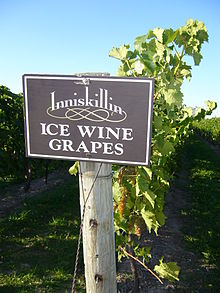Karl Kaiser (winemaker)
Karl Josef Kaiser (born September 22, 1941 in St. Veit an der Gölsen , Austria ; † November 22, 2017 in Niagara Falls , Canada ) was an Austrian-Canadian winemaker .
Life
Karl Kaiser was born on September 22, 1941, the seventh of nine children of Josef Kaiser and Katharina Renz, a farming family, in the village of St. Veit an der Gölsen , a few kilometers south of St. Pölten , where he grew up in poor conditions. He was considered a talented student and was sent to the nearby Cistercian monastery Lilienfeld at the age of twelve . During his apprenticeship as a pastor , he learned Latin and Greek as well as the basics of viticulture by helping the local monks with the pressing . After completing school, Kaiser did not pursue a career as a pastor, but initially worked as a teacher in a language school or as a teacher at a business school and helped out with local winegrowers in his free time. During this time he also met his future wife Sylvia Petritsch, then 19 years old. She was also a native of Lower Austria , who, however, emigrated to Canada and was at the time on a visit to her grandparents who owned a winery and a wine tavern, where the couple met.
In 1969, two years after the two were married, they moved to Canada with their first child, a daughter, where Sylvia's parents already lived. Here he initially attended English language courses, worked as a gas station attendant and took on various other jobs with which he supported his family, which had now grown by two more children, a son and a daughter. In order to obtain a higher school education, he enrolled at the Brock University in St. Catharines , a town in the province of Ontario , a few kilometers from the Niagara Falls walk, and was here first study history before he was told that his English this would be too bad. For a chemistry degree , which he completed in 1974, it was thought that his knowledge of English would be sufficient.
In the same year he and his partner Donald Ziraldo received the first wine growing license in Canada since Prohibition . Viticulture has been practiced in Canada since the early 19th century, but it was by no means at a high level. The two partners, who described the wine available in the province of Ontario as inedible, took this as an opportunity to raise Canadian wine to a new level and to create something for the premium segment. Noble vines were grown under the two for the first time, with Riesling , Chardonnay and Gamay being the first varieties that the newly founded Inniskillin winery produced on an area of 32 acres at the time. Together they were involved in the founding of the Vintners Quality Alliance (VQA), a system for the classification of quality wines and their appellation, based on the European system Appellation d'Origine Contrôlée and Denominazione di origine controllata .
In 1991 Kaisers Eiswein with the name Inniskillin Vidal Icewine from 1989 prevailed against 4,000 competitors at the renowned VinExpo (see also under wine fair ) in Bordeaux and won the Grand Prix d'Honneur . This helped the wine country Canada to gain worldwide recognition for the first time. Although ice wine remained the company's driving force, and it won numerous other global awards with it, it also received the same for table wines.
On the initiative of and under the leadership of Kaiser, the Cool Climate Oenology and Viticulture Institute (CCOVI) was founded at his alma mater in 1991 and an Oenology and Viticulture Undergraduate Program started. Because of his academic activities and efforts, he received numerous honors throughout his life. In 1993 he received the Order of Ontario for his services . In 1994 he received an honorary doctorate from Brock University, among others, and in 2002 he was awarded the Queen Elizabeth II Golden Jubilee Medal . In 2005, shortly before his retirement, he was honored by the Ontario Wine Society with an award for his life's work ( Ontario Wine Society Lifetime Achievement Award ).
On November 22, 2017, Kaiser died at the age of 76 in the Greater Niagara General Hospital in Niagara Falls , leaving behind his wife Sylvia, as well as three children and seven grandchildren. His three children, whom he had with his wife, are all successfully active in the wine industry as of 2013. While his demise was reported in a large number of media, especially in Canada, the Austrian media only became aware of the death of the viticulture pioneer in January 2018. In his Canadian homeland, a joint ice harvest took place in his memory, in which around 300 people took part.
Klaus Reif , a German immigrant and also winery in Ontario, called emperor as the "grandfather of Canadian wine" (English. Grandfather of Canadian wine ).
Web links
- Wine pioneer Karl Kaiser dies in Canada
- Canadian wine pioneer dies
- In Memory of Dr. Karl J. Kaiser 2017 (English)
Individual evidence
- ↑ The Globe and Mail (Prairie Edition) , December 9, 2017 edition, accessed on January 12, 2018
- ↑ a b c Winemaker Karl Kaiser helped birth Niagara's industry (English), accessed on January 12, 2018
- ↑ Weinmenschen: The Ice Wine King from Canada , accessed on January 12, 2018
- ↑ Karl Kaiser, 76, was the grandfather of Canadian winemaking (English), accessed on January 12, 2018
| personal data | |
|---|---|
| SURNAME | The Emperor Karl |
| ALTERNATIVE NAMES | Kaiser, Karl Josef (full name) |
| BRIEF DESCRIPTION | Austrian-Canadian winemaker |
| DATE OF BIRTH | September 22, 1941 |
| PLACE OF BIRTH | St. Veit an der Gölsen , Austria |
| DATE OF DEATH | 22nd November 2017 |
| Place of death | Niagara Falls , Canada |
